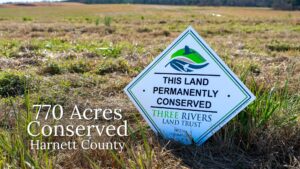
by Ruth Ann Grissom
September 14, 2016
 The “typical” Piedmont farm probably brings to mind an image of rolling fields and pastures bordered by narrow bands of hardwood trees, for the poetic among us, perhaps even the muted hues of cornstubbled fields or the vibrant green of winter wheat. But in the heart of the Uwharries, where our land is steep and rocky, many of our “farms” are devoted primarily – or even exclusively – to trees.
The “typical” Piedmont farm probably brings to mind an image of rolling fields and pastures bordered by narrow bands of hardwood trees, for the poetic among us, perhaps even the muted hues of cornstubbled fields or the vibrant green of winter wheat. But in the heart of the Uwharries, where our land is steep and rocky, many of our “farms” are devoted primarily – or even exclusively – to trees.
We think of a farmer as someone who “tends” the land. This term implies care and active management. Growing trees might seem passive, but dedicated tree farmers aren’t content to sit back and wait for the occasional harvest. The American Tree Farm System (ATFS) was founded in 1941 to recognize stewards who strive to manage their land not only for timber production, but also for water quality, wildlife habitat and outdoor recreation. The affiliated North Carolina Tree Farm Program (NCTFP) has its own board of directors comprised of landowners and natural resource professionals. As of 2015, there were 1,034 recognized tree farms in the state, encompassing 288,669 acres, with an average acreage of 279 acres per farm.
On these farms, landowners might leave wider buffers along waterways than minimums required by standard best management practices. Even though loblolly pines are thinned to allow the remaining trees to put on more girth, doing so also lets sunlight reach the forest floor to encourage a lush herbaceous layer. Some landowners introduce fire to promote a diverse suite of native grasses and forbs. Some remove invasive species such as tree of heaven and privet. Many create and maintain paths to allow access for hiking, birding or hunting.

While landowners can enjoy these amenities – and the sense of pride that comes with managing a tract of timberland with care – these stewards can also reap tangible benefits for their additional effort and expense. If they choose to lease their land to hunters, they can command top dollar. There can be even larger financial incentives. The timber from these farms can be certified as coming from a sustainable source, which opens up additional markets and potentially brings a premium price at harvest.
The first step in becoming a certified Tree Farm is having a detailed forest management plan that meets the criteria of ATFS. This is no small undertaking, but assistance is available. Biologists with the NC Wildlife Resources Commission’s Private Lands Program (http://ncforestservice.gov/Managing_your_forest/pdf/NCWRCPrivateLandsBrochure.pdf) are available to provide input for landowners willing to make a significant commitment to wildlife habitat. A professional forester can help landowners distill their management goals into actionable objectives, the basis of a solid management document. A forester certified by the ATFS program will review the plan then make periodic inspections to assure compliance.
A small farm in Stanly County recently earned the Tree Farm distinction, and the NCTFP has already made it a part of a day-long workshop to showcase a variety of desirable management approaches. A 25-acre tract of loblolly pines, planted in 1986, was thinned right on schedule about 15 years ago. Since then, it has been burned at least a dozen times. A patch of native grasses is also burned on an annual basis. Nearby, rows of sunflowers made for a spectacular dove hunt over Labor Day weekend. A freshly-thinned stand of loblolly pines covers a mere 13 acres, but it still merits careful consideration to determine the best approach for its next phase of management.
To learn more about what’s involved in becoming a certified Tree Farm, landowners can request an information packet at https://www.treefarmsystem.org/request-information-join-american-tree-farm-system or contact state director Leslie McCormick at (919) 917-8646 or nctreefarm@gmail.com.